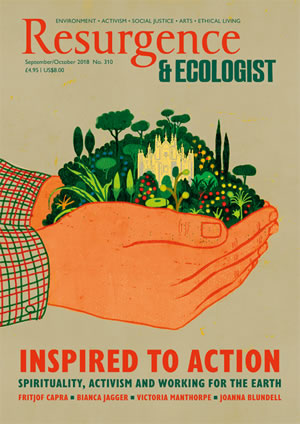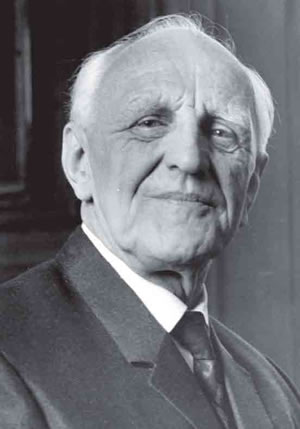This morning, the view outside my sitting room window has been transformed by six inches of snow. Every branch glistens in the bright sunshine. Blackbirds, sparrows and tits are singing and knocking showers of snow off as they search for food. It feels good to be alive. But what if I looked out of my window and could see intellectually that it was a glorious scene but was unable to feel it? If nothing gave joy? If everything felt unreal? If, instead of feeling alive, I felt a kind of deadness inside? If, instead of meaning, there was futility, the antithesis of creativity? This is quite a common experience which fortunately for most is short-lived but for some feels eternal. Resurgence has been in the vanguard of alerting us to the increasing disconnection between nature and mankind. Donald Winnicott, paediatrician and psychoanalyst was interested in the disconnection or dissociation within ourselves, but firstly I would like to briefly outline his ideas on creativity.
In 1970, towards the end of his life, Winnicott wrote, “Creativity, then, is the retention throughout life of something that belongs to infant experience: the ability to create the world. For the baby this is not difficult, because if the mother is able to adapt to the baby’s needs, the baby has no initial appreciation of the fact that the world was there before he or she was conceived or conceived of.” Winnicott thought that the average “good enough” mother, through identification with her infant in the first few weeks of life, manages instinctively to create the illusion for the infant that he or she has created the world. She protects her infant from unnecessary impingements such as very loud noises, angry shouting, cold water, prolonged hunger. Gradually she introduces the world “in small doses” matching the baby’s capacity to cope with external reality, being careful not to overwhelm the baby.
Winnicott helped mothers (and fathers) feel confident about parenting, because he had confidence in the natural ability of parents whilst at the same time articulating the everyday frustrations, doubts and difficulties. Perhaps he is most famous for introducing the term ‘transitional object’. At some time the baby may become attached to a special object such as a piece of cloth, a toy or a ribbon. Winnicott noticed that these objects are often inseparable: they are loved, hated and discarded and then found again. Although they are used to allay anxiety, particularly at night, they aren’t just comforters.
Winnicott thought that this development marks a transition for the baby in managing the outside world. The object is not created by the baby/child, nor does it belong to the outside world. Winnicott named such objects ‘transitional’ as they are neither ‘me’ nor ‘not me’. They are neither true subjective objects (created by the baby) nor do they entirely belong to the world of objective objects (‘not me’ objects). Whereas the younger infant doesn’t experience the world as outside, the developing baby starts to realise that there is a ‘not me’, which he or she cannot control.
The transitional object helps make the gap between subjective reality and objective reality bearable. Eventually the transitional object loses meaning for the child, but the intermediate space that has opened up between the inner world of the child and the outside world remains. “Transitional objects and transitional phenomena belong to the realm of illusion which is at the basis of initiation of experience,” wrote Winnicott. “This intermediate area of experience, unchallenged in respect of its belonging to inner or external (shared) reality, constitutes the greater part of the infant’s experience, and throughout life is retained in the intense experiencing that belongs to the arts and to religion and to imaginative living, and to creative scientific work.”
Winnicott thought that illusion was essential to health and creative living. Utter absorption in a piece of music or wonder at a piece of art or a snowy landscape is a moment when the world is not exterior, but feels inseparable from oneself. They are moments when it is as if one has created the world. This is a direct extension of the child lost in play. Unlike Freud and Klein, Winnicott laid emphasis on the phenomenon of play rather than its content. He had always been fascinated by Tagore’s words in the Gitanjali “On the seashore of endless worlds children play.” He eschewed a psychoanalytic study of play’s unconscious symbolism: “Play is neither a matter of inner psychic reality nor a matter of external reality... if play is neither inside nor outside, where is it?” he asks. He locates play in the intermediate space and reiterates a plea to those involved with children: “We agree never to make the challenge to the baby, did you create this object, or did you find it conveniently lying around?” Questioning the paradox destroys the illusory quality of play. How often do you hear adults trying to engage children’s intellect prematurely by asking them to describe what they are doing when they are busy playing?
Winnicott understood the intermediate area as a third area (in contrast to inner psychic reality and the shared external world), and that it is this third area that makes life worth living and wherein the whole cultural life of humans resides. It is the experience in the intermediate area of play that builds up the unique ‘me-ness’ of the self. He thought that cumulative experience in this area contributes to the common pool of cultural experience. Creativity is universal and needs no special talent. It belongs to feeling alive. “It is in playing and only in playing that the individual child or adult is able to be creative and to use the whole personality, and it is only in being creative that the individual discovers the self.” No other psychoanalyst or psychologist had quite seen things like this before, and the phrase ‘transitional object’ entered everyday language beyond the boundaries of psychology.
Flicking through last year’s issues of Resurgence & Ecologist, many articles lay great emphasis on the everyday creativity of ordinary people. Being connected to a community with opportunities for giving and receiving enhances feelings of wellbeing, vitality and creativity. Such communities can provide a maternal type of holding in times of individual grief and suffering. The wonderful account of Compassionate Frome (Resurgence & Ecologist Issue 307) illustrates not only the creativity of the two founders and the volunteers, but also that of the recipients, who rediscovered their own creativity through singing in a choir, to take one example.
Among many articles on the benefits of reconnecting with Nature, Pierre Rabhi, in conversation with Satish Kumar (Resurgence & Ecologist Issue 303), speaks about humans being alienated from Nature, reduced to servitude to an unnatural system where time is money. He thinks that the mind has created the separation between Nature and humans, but that this separation is not real and we need to return to the source, Mother Earth. The person who looks out at a beautiful snowy landscape and knows intellectually that it is beautiful but cannot really feel the wonder is similarly alienated. Such a person has at least temporarily lost the feeling of aliveness and creativity. Rabhi's idea that the mind has come between man and nature is echoed in Winnicott's concept of the mind in relation to “psychesoma”. In health, the mind or intellect is an integral part of a psychosomatic unity which has been built up through “good-enough care. The psyche is the imaginative expression of the soma or body. When there have been serious impingements interrupting the healthy development of the baby's self, the intellect can take over and act as a caretaker, but at a cost of never feeling real which may result in depression later on in life or a psychosomatic illness. Such a dissociation or illness could be seen as a signal that the early relationship with the source mother (Earth) needs attending to.
Winnicott thought that humans are not inherently greedy, self-serving, envious or hedonistic. He thought that the environment, particularly that which surrounds the child in the first few years of life, is crucial. It doesn’t have to be perfect – in fact, the pursuit of perfection could itself be problematic – but it just has to be good enough to allow the child’s own inborn creative potential to flourish. Illness, neglect or trauma interfere with this process, resulting in dissociations within the self. I think there is a corollary in the alienation between man and nature described in some of the Resurgence articles.
I leave Winnicott to have the final word: “Come at the world creatively, create the world. It is only what you create that has meaning for you.”








